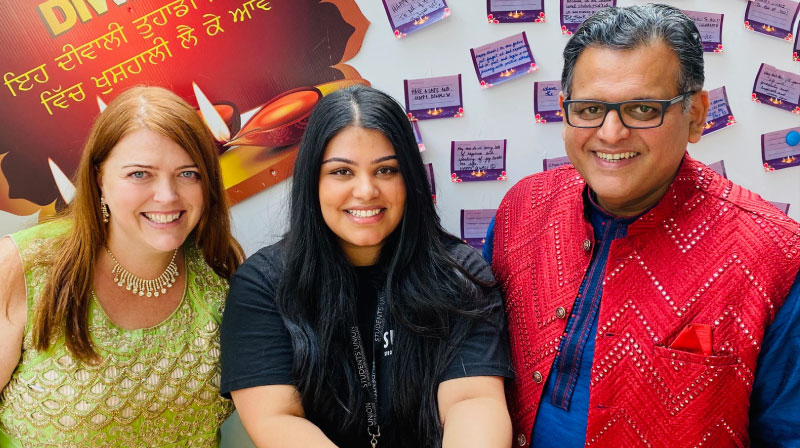Access to education and diversity in leadership key contributors to eliminating racial discrimination
 VCC president, Ajay Patel (left), with staff and students at Diwali festivities hosted at VCC.
VCC president, Ajay Patel (left), with staff and students at Diwali festivities hosted at VCC.
Article originally published in Canadian Immigrant
Observed annually, March 21 marks the United Nations’ International Day for the Elimination of Racial Discrimination (IDERD). The day commemorates the 69 people killed by police during a peaceful demonstration against apartheid laws in Sharpeville, South Africa in 1960.
As a point of pride, Canada and B.C. were among the first to support IDERD in 1989, yet tragically, sixty-three years later, racial discrimination continues to have tragic and far-reaching consequences for many under-represented groups. Racial discrimination is insidious, and for every step made toward inclusion and respect, injustice and prejudice seem to follow. We see it in the news. And sadly, we see it on campuses all across the country.
This struggle is always top of mind for me in my role as president and CEO of Vancouver Community College (VCC). As a post-secondary leader, I have an opportunity and an obligation to effect change for our students and the broader community. According to B.C.’s latest Labour Market Outlook, there will be one million job openings in the province during the next 10 years. It is well-known amongst my peers that 78 per cent of those in-demand jobs will require post-secondary training. But the bigger challenge will be meeting the needs of the new immigrants who are expected to fill over 38 per cent of those jobs.
At VCC, we have the privilege to serve students who face some of the highest barriers to education: 29 per cent are Canadian newcomers, 10 per cent have diverse abilities. We also have a fast-growing population of urban Indigenous learners. For these people in our community, accessible, affordable, and inclusive education is vital. And with the employment demands on our province growing apace, these unique demands to create accessible skills-training for newcomers will only increase.
It is a complex endeavour that resonates with me personally. I immigrated to Canada from Fiji as a young boy with my family and struggled very much with my identity — a common theme among first-generation Canadians. It wasn’t until I learned to embrace who I am and recognize that being a person of colour means I offer a unique and valuable perspective to my community and the organizations and people I work with. Even now, it continues to be a work in progress for me.
VCC has made some good strides towards creating supports and access for immigrant learners in BC. We offer English for Careers programs in vocations such as cooks and health care assistants – jobs that have been hardest hit by labour shortages and typically filled by Canadian newcomers. And recently, we completed a successful pilot project that uses virtual reality and artificial intelligence to help students practice their communication skills in job interviews. The goal is to give them the interview experience and confidence they need to enter the labour market much faster.
I see the diversity in our VCC community growing quickly, and I am proud of the hard work we are putting towards equity, diversity and inclusion. I welcome it. But I also know we need to do more.
Across the public sector, the lack of diversity is crushingly evident. Data published by The Vancouver Sun revealed that out of the top 100 public sector wage earners in B.C., only 28 per cent of them were women. When VCC recently recruited a leadership position at the college, we mandated a diverse talent pool to choose from. I was told by our recruitment agency that we were one of only a few clients to request this.
I am proud that VCC’s leadership team is comprised of 50 per cent women (persons who identify as female) and 50 per cent of the team identifies as ethnically diverse or from an under-represented group.
Still, we have much work to do when it comes to eliminating racial discrimination. Access to education and diversity in leadership are two contributions that VCC, and others in post-secondary education, can champion toward the cause. Think about what you and your organization can do to eliminate racial discrimination.
Ajay Patel is a first-generation Canadian and president and CEO of Vancouver Community College.
